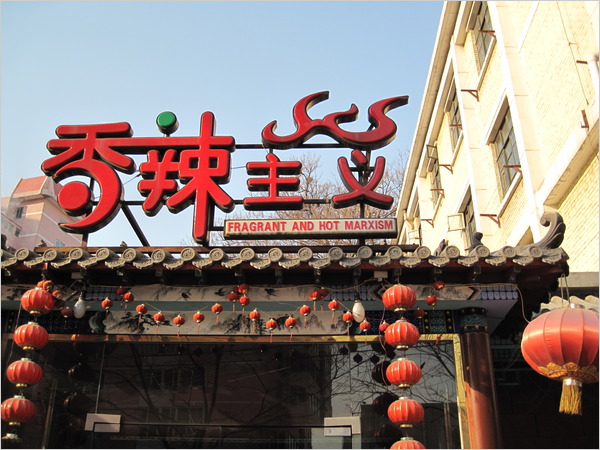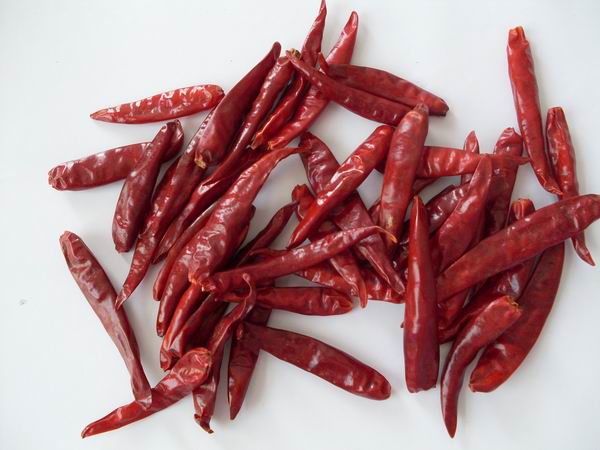Fragrant and Hot Marxism
« previous post | next post »
This was covered fairly well five years ago, but it has recently come alive again:
The latest iteration is on Engrish.com, where, after posting on 12/17/15, it quickly gathered scores of witty captions:
"Your ideology gives me indigestion"
The same sign appeared in a Chinglish slideshow on the NYT site in 2010, accompanying this article by Andrew Jacobs:
"Shanghai Is Trying to Untangle the Mangled English of Chinglish" (5/2/10)
The translation was explained at the time by John Emerson in a comment on Language Hat:
"Fragrant and hot Marxism" is a translation of a bit of Chinese word play – it should be "Fragrant-hot-ism", as though that style of cooking were an ideology.
It was featured even earlier, at the beginning of January 4, 2009, on "The Chinglish Files by olr", hosted by Oliver Lutz Radtke, the doyen of Chinglish studies.
The sign says:
xiānglà zhǔyì 香辣主义 ("spicyism")
I found "spicyism" on a page of a curious website called WordCreator that also offered a plethora of German suffixes (Wortendungen).
As for the precise signification of xiānglà 香辣 (lit., "fragrant-spicy"), I believe that it generally refers to food cooked with Sichuan peppercorn and dried red pepper, not fresh green pepper or salted green pepper.
See, among others, the following Language Log posts:
"Wonton in Zanthoxylum schinifolium etzucc sauce " (5/6/15)
"Bean crud " (1/9/14) (comments by MaryKaye and Victor Mair)
When the restaurant came up with this catchy name, I suppose what they had in mind is something like "we wrote the book on spicy food" or "we adhere to the doctrine of spicy food".
There probably are as many Chinese zhǔyì 主义 ("ism") as there are English "isms" (see here and here), for which see this Chinese Wikipedia list (each entry is clickable).
One cool –> hot thing that I can add is an explanation of the symbol at the top of the sign. I think that it is a stylization of the character huǒ 火 ("fire"), which we talked about quite a bit last week:
"Firefighting without the fire " (12/12/15)
[Thanks to Ben Zimmer, Jing Wen, and Rebecca Fu]
Late addition from Yixue Yang, a native of Sichuan:
Normally, when Sichuan people say xiānglà 香辣, it refers to a cuisine mainly using gān làjiāo 干辣椒 ("dried red pepper [paprika]"). To create the specific "xiāng 香", you'll have to put gān làjiāo 干辣椒 with some minced fresh ginger and garlic into heated vegetable oil. Then you put meat and vegetables in the sauce soup, and fry… There will come this overwhelming appetizing smell we call "xiāng 香", as well as smoke, which would probably set off the fire alarm.
However, you caught me off guard in terms of translating the word "xiāng 香". I don't think it can be directly related to "aromatic", "savory", etc. in English. I guess "xiāng 香" is only added in front of "là 辣" to make a two-word term, compared with málà 麻辣 ("numbing spicy"), suānlà 酸辣 ("sour spicy"), etc.
So, I really do not have a perfect English translation of "xiāng 香". If you have a clue, please please make sure to tell me!! And how about making the smell in the kitchen and see if the Muse comes?
Late addition from Fangyi Cheng, a native of Hunan, the other Chinese province famous for its spicy food:
I think the xiāng 香 in xiānglà 香辣 just refers to the smell of the dishes. The xiānglà 香辣 is different from the spicy dishes of Hunan province, which is usually pure spicy là 辣. The xiānglà 香辣 dishes usually have sesame oil, chili oil, pepper oil, garlic, or something else added. This is just my understanding, and is not necessarily right.


Ken Miner said,
December 21, 2015 @ 1:56 am
I think "bean crud" is absolutely delightful (though in real life – as they say – I love tofu; bean DNA is almost as complex as ours, or so I have read)
maidhc said,
December 21, 2015 @ 5:08 am
I heard this story from some Chinese people a long time ago. Maybe it's an urban legend. They were building a new railway station in Hunan (is that right?) back in Mao's time, and it was decided to have a heroic sculpture on top of a worker carrying a flaming torch. But which way should the flame go? To the right? That can't be. To the left? Maybe that's not good either. So to avoid offending anyone, the artist had the flame go straight up. Everyone immediately started calling it the Red Pepper.
Victor Mair said,
December 21, 2015 @ 8:25 am
Nice story, maidhc. You'll notice that the flame atop this post-Mao, post-Deng restaurant is running toward the right.
Mara K said,
December 21, 2015 @ 11:30 am
I learned 香 as meaning "fragrant." Which made sense to me as an undergrad, since I've seen that character and morpheme used to represent both cilantro and incense. That makes me wonder, though: what did Hong Kong (香港) smell like when it was named?
David Marjanović said,
December 21, 2015 @ 12:56 pm
If you mean genome size, that doesn't have anything to do with anything other than cell size.
Wwwwwwweeellllll, the things a harbor (港) typically smells like…